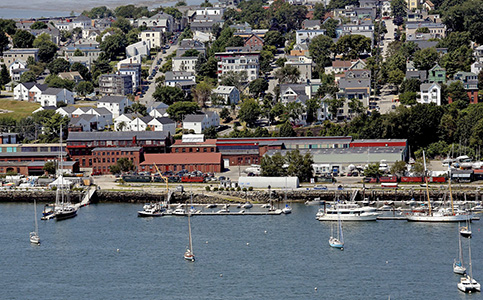There’s an important detail worth calling out about Portland’s recent crop of anti-development groups: The people who are spending the most time, money and energy to fight new construction in our city are all wealthy homeowners.
The founders of Keep Portland Livable, the organization that blocked 775 new apartments in Bayside, and the lead principals of the group Save the Soul of Portland, which is opposed to any new multi-story apartment buildings along Fore Street at the Portland Co. site, all own lovely homes in some of Portland’s most desirable neighborhoods.
What’s really behind these homeowners’ passionate opposition to moderately tall buildings in the middle of the city? Their points of view may vary, but they have one thing in common: Their political values are closely tied to the value of their real estate.
Portland’s housing shortage benefits property owners – especially homeowners in the city’s most desirable neighborhoods – by driving up housing prices.
If the “midtown” project in Bayside and the Portland Co. redevelopment had been allowed to proceed as approved, lots of new housing options would be coming on the market right now, with more choices for renters and homebuyers and more competition among landlords.
Instead, we’re living in a city that’s generated a lot of demand among people who want to live here, but hasn’t accommodated them with a commensurate increase in the amount of housing that’s available for them. The self-evident result is gentrification and displacement.
The exclusionary policies favored by wealthy homeowners are a primary factor in the city’s rapidly escalating rents and home prices, which, in turn, generate escalating real estate wealth for those same privileged homeowners.
If you’re the owner of an expensive home on the Portland peninsula, spending a few grand on attorneys and Facebook ads to stir up revolts against new buildings is a bargain if it helps cultivate future bidding wars on your own real estate.
The homeowners from Soul of Portland and Keep Portland Livable have occasionally tried to argue that they’re protecting Portland’s egalitarianism, by fighting new “luxury” housing. That’s a funny argument to hear from people who themselves live in luxury housing and are amassing impressive wealth from it.
But building less housing won’t do anything to stop rich people from moving here. If Portland’s response to gentrification is simply to say “no” to new buildings, then the wealthy will simply buy up more of our existing buildings and kick out our neighborhoods’ dwindling populations of young people and working families in order to make themselves comfortable – which, in fact, is exactly what we’ve seen on Munjoy Hill and in the West End in recent years.
If we’re actually committed to being an inclusive city, we need an inclusionary attitude about new housing for everyone.
But anti-housing lobbying from the wealthy isn’t just bad for our city’s diversity. It’s also bad for our city’s democracy.
Urban planning is a process of compromise. The need to build more apartments and the desire to have short buildings downtown are inherently in conflict. It’s up to policymakers to decide how to strike a balance, but ultimately, the aesthetic concerns of a small group have to take a back seat to the basic humanitarian needs of the city as a whole.
The lawsuits and referendum drives of the anti-housing groups reverse those priorities. As we saw in Bayside, the long delays imposed by these lawsuits are frequently enough to sink an apartment project entirely – or, as Keep Portland Livable co-founder Peter Monro himself put it (with chilling foresight): “The power to delay is the power to destroy.”
In effect, wealthy residents with the financial resources to hire lawyers and publicists can (and do) seize veto power for themselves over the city’s otherwise democratic planning process.
Question 2, the “Soul of Portland” referendum on the ballot this fall, would grant even more extraordinary powers to privileged homeowners. If passed, Question 2 will effectively shut down the possibility of building new affordable housing on the hillside – the risks of prospective legal costs will be too high for nonprofit developers to bear. It’s legislation written by gentrifiers, for gentrifiers.
Instead of giving the city’s wealthiest residents even more power over our public planning process, it’s time to hold the wealthy homeowners behind Soul of Portland and Keep Portland Livable accountable for their selfishness.
Far from “saving” our city, they’re inflicting harsh costs on the vast majority of Portland families who are less fortunate than their own.
Send questions/comments to the editors.



Success. Please wait for the page to reload. If the page does not reload within 5 seconds, please refresh the page.
Enter your email and password to access comments.
Hi, to comment on stories you must . This profile is in addition to your subscription and website login.
Already have a commenting profile? .
Invalid username/password.
Please check your email to confirm and complete your registration.
Only subscribers are eligible to post comments. Please subscribe or login first for digital access. Here’s why.
Use the form below to reset your password. When you've submitted your account email, we will send an email with a reset code.